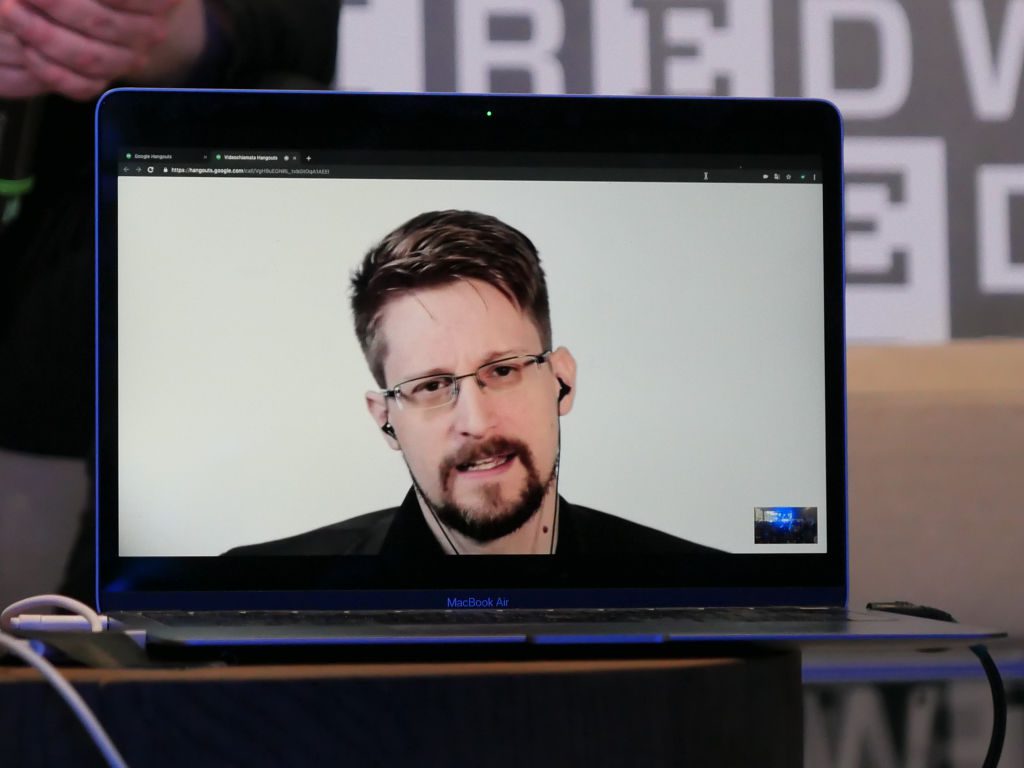Donald Trump Should Pardon Edward Snowden

Last weekend, President Donald Trump raised the prospect of a pardon for whistleblower Edward Snowden. He should follow through and reward him for exposing the deep state’s overreach into the private affairs of all Americans.
Thus far, liberty-minded voters have loved the president’s ending of the longest war in our nation’s history, his tax cutting, and his slashing of regulations. But granting a pardon to Snowden would make him a hero to this core voting bloc, which would translate into higher voter turnout in his favor this fall.
The D.C. establishment despises the idea of a pardon for Snowden. Just look at former director of national intelligence and frequent Trump critic James Clapper as a case study in the establishment view. In March 2013, Clapper testified before the Senate Intelligence Committee. Senator Ron Wyden asked him, “Does the NSA collect any type of data at all on millions, or hundreds of millions of Americans?” Clapper responded, “No sir, not wittingly.” As attorney Jonathan Turley later noted in USA Today, “that was a lie and Clapper knew it when he said it.”
Three months after that testimony, The Guardian and the Washington Post released a series of stories about how the National Security Agency (NSA) had collected Americans’ phone and internet data under a different program. They’d received this tip because of information provided by Edward Snowden, who exposed the Clapper lie.
The Snowden revelations led to a national debate over privacy versus security. Before that, there hadn’t been much pushback from politicians over the breadth of the federal government’s expanded powers. Yet these revelations caused the nation to look inward on the issue of privacy and ask how much power citizens should allow to the federal government in the name of preventing terrorism. The disclosures raise the question: if Snowden hadn’t told us about these programs, who would have? Snowden has since been accused of treason, yet the people who set up the program have faced no consequences. They should be the ones subjected to scrutiny.
Patriotism means different things to different people. I consider young men and women who volunteer to go to Afghanistan and Iraq to be heroes, because they know the dangers and willingly put themselves in harm’s way to protect America. I also believe it is patriotic for somebody who works inside the government to upend their whole life to expose violations of the Constitution and Bill of Rights. To denigrate Snowden for not following whistleblower laws is absurd—had he done so, we would never have known about these massive infringements on American privacy.
On Snowden, I, a conservative Republican, am in agreement with liberal ACLU executive director Anthony Romero. In 2013, Romero wrote of Snowden, “as a whistleblower of illegal government activity that was sanctioned and kept secret by the legislative, executive, and judicial branches of government for years, he undertook great personal risk for the public good.” Snowden singlehandedly spurred a global debate on privacy and the surveillance state. There is a growing consensus on the right and the left that Snowden is a patriot and should be pardoned, from liberty-supporting Republican Congressman Thomas Massie to liberal firebrand Congresswoman Tulsi Gabbard.
The Fourth Amendment to the Constitution recognizes Americans’ right to privacy. It states, “The right of the people to be secure in their persons, houses, papers, and effects, against unreasonable searches and seizures, shall not be violated, and no Warrants shall issue, but upon probable cause, supported by Oath or affirmation, and particularly describing the place to be searched, and the persons or things to be seized.” That was violated by the federal government when the Bush administration initiated warrantless wiretapping and the internet monitoring program that sucked up the information of American citizens without a warrant based on probable cause.
My firm, Liberty Government Affairs, released a poll in September 2018 that found strong support for a Snowden pardon. A pardon would show that President Trump is fighting tooth and nail against the D.C. swamp and not afraid to buck the inside-the-Beltway consensus.
Brian Darling is former counsel and senior communications director for Senator Rand Paul.